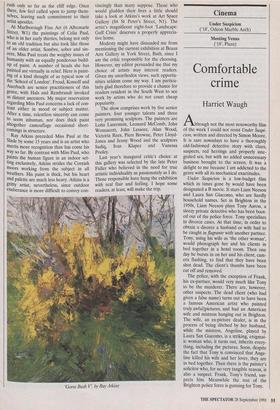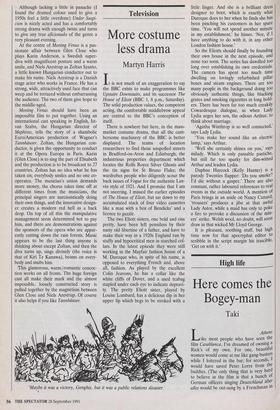Cinema
Under Suspicion (`18', Odeon Marble Arch) Meeting Venus (`18', Plaza)
Comfortable crime
Harriet Waugh Athough not the most noteworthy film of the week I could not resist Under Suspi- cion, written and directed by Simon Moore. It is rare nowadays to have a thoroughly old-fashioned detective story with clues, suspects, red herrings and properly inte- grated sex, but with no added unnecessary business brought to the screen. It was a delight to me because I am addicted to the genre with all its mechanical exactitudes.
Under Suspicion is a low-budget film which in times gone by would have been designated a B movie. It stars Liam Neeson and Laura San Giacomo, who are hardly household names. Set in Brighton in the 1950s, Liam Neeson plays Tony Aaron, a sleety private detective who has been boot- ed out of the police force. Tony specialises in divorce cases. At that time, in order to obtain a divorce a husband or wife had to be caught in flagrante with another partner. Tony, using his wife as 'the other woman', would photograph her and his clients in bed together in a hotel room. Then one day he bursts in on her and his client, cam- era flashing, to find that they have been shot dead. The client's thumbs have been cut off and removed.
The police, with the exception of Frank, his ex-partner, would very much like Tony to be the murderer. There are, however, other suspects. The dead client (who had given a false name) turns out to have been a famous American artist who painted truly ,awful 'pictures, and had an American wife and mistress hanging out in Brighton. The wife, an ex-picture dealer, is in the process of being ditched by her husband, while the mistress, Angeline, played by Laura San Giacomo, is a striking, enigmat- ic woman who, it turns out, inherits every- thing, including the pictures. Soon, despite the fact that Tony is convinced that Ange- line killed his wife and her lover, they are in bed together. Then there is the painter's solicitor who, for no very tangible reason, is also a suspect. Frank, Tony's friend, sus- pects him. Meanwhile the rest of the Brighton police force is gunning for Tony. Although lacking a little in panache (I found the drained colour used to give a 1950s feel a little overdone) Under Suspi- cion is nicely acted and has a comfortably strong drama with enough twists and turns to give any true aficionado of the genre a very pleasant evening.
At the centre of Meeting Venus is a pas- sionate affair between Glen Close who plays Karin Anderson, a Swedish super- diva with magnificent posture and a warm smile, and Niels Arestrup as Zoltan Szanto, a little known Hungarian conductor out to make his name. Niels Arestrup is a Danish stage actor who works in France. He has a strong, wide, attractively used face that can weep and be tortured without embarrassing the audience. The two of them give hope to the middle-aged.
Meeting Venus should have been an impossible film to put together. Using an international cast speaking in English, Ist- van Szabo, the Hungarian director of Mephisto, tells the story of a shambolic Euro/American production of Wagner's Tannhauser. Zoltan, the Hungarian con- ductor, is given the opportunity to conduct it at the Opera Europa in Paris. Karin (Glen Close) is to sing the part of Elisabeth and the production is to be broadcast to 27 countries. Zoltan has no idea what he has taken on; everybody smiles and no one co- operates. The musician's union demands more money, the chorus takes time off at different times from the musicians, the principal singers are narcissistically doing their own things, and the innovative design- er creates a modern red hell as a back drop. On top of all this the manipulative management seem determined not to pay him, and there are demonstrations against the sponsors of the opera who are appar- ently cutting down the rain forests. Music appears to be the last thing anyone is thinking about except Zoltan, and then the diva turns up, sings divinely (the voice is that of Kiri Te Kanawa), beams on every- body and snubs him.
This glamorous, warm ,Iromantic concoc- tion works on all fronts. The huge foreign cast all make their mark and the almost impossible, loosely constructed story is pulled together by the magnetism between Glen Close and Niels Arestrup. Of course it also helps if you like Tannhauser.
`Maybe it was a victory, Genghis, but it was a public relations disaster.'



































































 Previous page
Previous page